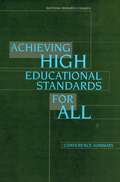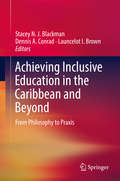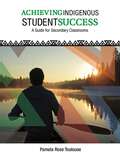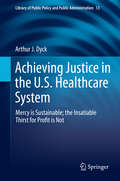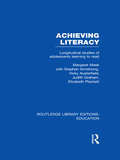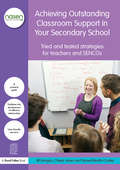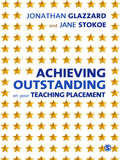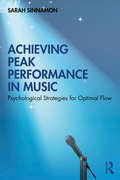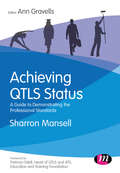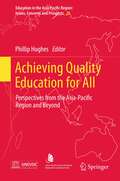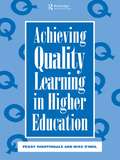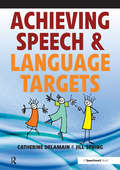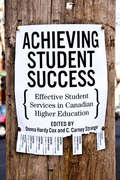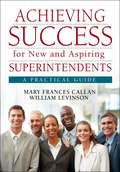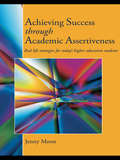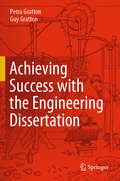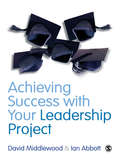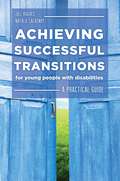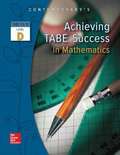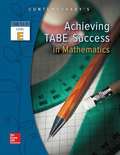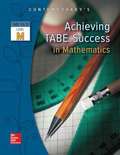- Table View
- List View
Achieving High Educational Standards for All: Conference Summary
by Timothy Ready Catherine E. Snow Christopher F. EdleyThis volume summarizes a range of scientific perspectives on the important goal of achieving high educational standards for all students. Based on a conference held at the request of the U.S. Department of Education, it addresses three questions: What progress has been made in advancing the education of minority and disadvantaged students since the historic Brown v. Board of Education decision nearly 50 years ago? What does research say about the reasons of successes and failures? What are some of the strategies and practices that hold the promise of producing continued improvements? The volume draws on the conclusions of a number of important recent NRC reports, including How People Learn, Preventing Reading Difficulties in Young Children, Eager to Learn, and From Neurons to Neighborhoods, among others. It includes an overview of the conference presentations and discussions, the perspectives of the two co-moderators, and a set of background papers on more detailed issues.
Achieving Inclusive Education in the Caribbean and Beyond: From Philosophy to Praxis
by Stacey N. Blackman Dennis A. Conrad Launcelot I. BrownThis book offers an international perspective of philosophical, conceptual and praxis-oriented issues that impinge on achieving education for all students. It sheds light on the historical, systemic, structural, organizational, and attitudinal barriers that continue to be antithetical to the philosophy and practice of inclusive education within the Caribbean. The first section of the book examines how globalized views of inclusion informed by philosophical ideas from the North have influenced and continue to influence the equity in education agenda in the region. The second section considers how exclusion and marginalization still occur across selected Caribbean islands. It provides both quantitative and qualitative data about the nature and experience of exclusion in selected Caribbean islands, the UK and USA. The third section tackles the practical realities of transforming education systems in the Caribbean for inclusion. In particular, it identifies teacher practices as the main site of interrogation that needs to be tackled if inclusion is to be successful. The fourth and final section examines the contribution of principals and exemplars to the development and advocacy for inclusive education. It discusses how educational leadership is understood, as well as the role of school principals in making inclusion a reality in schools, the challenges experienced and the qualities of education leaders.
Achieving Indigenous Student Success: A Guide for Secondary Classrooms
by Pamela Rose ToulouseIn Achieving Indigenous Student Success, author Pamela Toulouse provides strategies, lessons, and hands-on activities that support both Indigenous and non-Indigenous learners in the secondary classroom. Read chapters on topics such as:Indigenous Pedagogy and Classrooms ConsiderationsIndigenous Self-Esteem and Mental Health ActivitiesDifferentiated Instruction and Bloom's TaxonomyAttrition, Retention, Transition, and Graduation ContinuumIndigenous Themes and Material ResourcesCulturally Appropriate Secondary Lesson Plans by Subject (including English, Math, Science, History, Geography, Health, Physical Education, Drama, Music, Visual Arts, Technological Studies, Business Studies, Indigenous Worldviews, Guidance and Career Studies, and Social Studies and the Humanities)This book is for all teachers of grades 9–12 who are looking for ways to infuse Indigenous perspectives into their courses. Ideas include best practices for retention/transition/graduation planning, differentiated instruction, assessment, and equity instruction. Using appropriate themes for curricular connections, the author presents a culturally relevant and holistic approach that helps to build bridges between cultures and fosters self-esteem in all students.
Achieving Indigenous Student Success: A Guide for Secondary Classrooms
by Pamela Rose ToulouseIn Achieving Indigenous Student Success, author Pamela Toulouse provides strategies, lessons, and hands-on activities that support both Indigenous and non-Indigenous learners in the secondary classroom. Read chapters on topics such as:Indigenous Pedagogy and Classrooms ConsiderationsIndigenous Self-Esteem and Mental Health ActivitiesDifferentiated Instruction and Bloom's TaxonomyAttrition, Retention, Transition, and Graduation ContinuumIndigenous Themes and Material ResourcesCulturally Appropriate Secondary Lesson Plans by Subject (including English, Math, Science, History, Geography, Health, Physical Education, Drama, Music, Visual Arts, Technological Studies, Business Studies, Indigenous Worldviews, Guidance and Career Studies, and Social Studies and the Humanities)This book is for all teachers of grades 9–12 who are looking for ways to infuse Indigenous perspectives into their courses. Ideas include best practices for retention/transition/graduation planning, differentiated instruction, assessment, and equity instruction. Using appropriate themes for curricular connections, the author presents a culturally relevant and holistic approach that helps to build bridges between cultures and fosters self-esteem in all students.
Achieving Justice in the U.S. Healthcare System: Mercy is Sustainable; the Insatiable Thirst for Profit is Not (Library of Public Policy and Public Administration #13)
by Arthur J. DyckThis book focuses on justice and its demands in the way of providing people with medical care. Building on recent insights on the nature of moral perceptions and motivations from the neurosciences, it makes a case for the traditional medical ethic and examines its financial feasibility. The book starts out by giving an account of the concept of justice and tracing it back to the practices and tenets of Hippocrates and his followers, while taking into account findings from the neurosciences. Next, it considers whether the claim that it is just to limit medical care for everyone to some basic minimum is justifiable. The book then addresses finances and expenditures of the US health care system and shows that the growth of expenditures and the percentage of the gross national product spent on health care make for an unsustainable trajectory. In light of the question what should be changed, the book suggests that overdiagnosis and medicalizing normal behavior lead to harmful, costly and unnecessary interventions and are the result of unethical behavior on the part of the pharmaceutical industry and extensive ethical failures of the FDA. The book ends with suggestions about what can be done to put the U.S. health care system on the path to sustainability, better medical care, and compliance with the demands of justice.
Achieving Literacy: Longitudinal Studies of Adolescents Learning to Read (Routledge Library Editions: Education)
by Margaret MeekHow children learn to read well and what kind of teaching helps them is a scarcely penetrated mystery. This book is a fascinating and informative research report by a group of teachers who set out to teach children who have failed to acquire a useful degree of literacy; in it they discuss their experiences. The authors are presenting evidence about a central and constant problem in education, an essential kind of evidence which is often ignored, because it is so difficult to collect and present. The report presents enough case-notes and recordings of lessons and discussions to allow readers to make their own interpretations alongside those of the writers. Highly informative about many of the central topics of teaching literacy it discusses children’s motivation, the influence of social and cultural background on learning, and different methods of teaching reading.
Achieving Outstanding Classroom Support in Your Secondary School: Tried and tested strategies for teachers and SENCOs (nasen spotlight)
by Jill Morgan Cheryl Jones Sioned Booth-CoatesAchieving Outstanding Classroom Support in Your Secondary School shows how secondary school teachers and other school staff can work with Teaching Assistants to ensure that classroom support is maximised and an optimum working relationship is developed. Based on research taken directly from the classroom, all recommendations and guidelines explored in this book are based on the findings of those who have consulted Teaching Assistants about their work, in order to better understand the dynamics of classrooms where at least one of the adults present is supporting the other, directly or indirectly. Topics studied include: Understanding the roles and responsibilities of the Teaching Assistant What the research tells us about Teaching Assistants How to plan before the lesson How to involve the Teaching Assistant in the lesson How to provide feedback and advocacy for the Teaching Assistant after the lesson This accessible text provides a highly supportive framework to prompt teachers to be proactive and plan ahead for effective use of their Teaching Assistants in the classroom and will be of interest to all secondary teachers, SENCOs, heads of departments and school managers.
Achieving Outstanding on your Teaching Placement: Early Years and Primary School-based Training
by Jonathan Glazzard Jane StokoeMaking a success of your teaching placement is a vital part of achieving qualified teacher status (QTS). With a focus on practical strategies and closely referenced to OfSTED, this book provides essential guidance on how to translate the 'outstanding' criteria into practice. The authors break down the OfSTED criteria so that you can easily identify the skills and knowledge you need to make the most of your placements. Packed with case studies, practical tasks and links to the QTS standards, the book is structured around: " developing professional knowledge " planning " how to be an outstanding teacher " classroom management " teamwork " assessment " Continuing Professional Development (CPD) This book will help trainees make the difficult jump from 'good' to achieving a Grade 1 'outstanding' on their placements. Jonathan Glazzard is Course Leader BA (Hons) in Early Primary Education at the University of Huddersfield. Jane Stokoe is Foundation Stage and KS1 leader, SENCO and Assistant Headteacher at Hoyland Springwood Primary School, Barnsley.
Achieving Peak Performance in Music: Psychological Strategies for Optimal Flow
by Sarah SinnamonAchieving Peak Performance in Music: Psychological Strategies for Optimal Flow is a unique and comprehensive exploration of flow in music performance. It describes the optimal performance experiences of great musicians and outlines ten psychological steps that can be implemented to facilitate and enhance optimal experience. Achieving Peak Performance in Music reveals strategies used by experts to prepare themselves emotionally, cognitively, and physically for performance. Combining this information with research carried out amongst professional performers and knowledge gained from decades of study and research by psychologists on how to achieve a positive experience, the book guides readers on a pathway towards optimal performance. Using everyday language, it presents invaluable practical guidance and a toolbox of strategies to help with all aspects of performance, including memorisation, visualisation, focus, performance anxiety, thought management, motivation, and pre-performance routines. Based on psychological research, the book shares practical knowledge invaluable to music students, parents, and amateur and professional musicians. The strategies on performance provided are applicable to every type of performance, from a student exam to a gig or a concert, making Achieving Peak Performance in Music a significant resource for anyone looking to achieve peak performance.
Achieving QTLS status: A guide to demonstrating the Professional Standards
by Ann Gravells Sharron MansellIf you are considering or working towards QTLS status, this text is for you. Over 20,000 practitioners have achieved QTLS status since 2008. The process was redesigned in 2016 therefore the time is right for a book like this. It will help anyone to understand the Professional Standards, which are used as the basis to gain QTLS status. This new text is a user friendly and clear guide to achieving QTLS status and is linked to the Professional Standards for Teachers and Trainers. Appropriate for anyone who wishes to maintain their practice in accordance with the Professional Standards for Teachers and Trainers Written in an accessible language for anyone aiming to achieve QTLS status, and/or to have parity with QTS Information regarding the minimum core, and observed teaching practice is included The content will help practitioners to have a positive impact upon their job role, their learners, their organisation and their career
Achieving QTLS status: A guide to demonstrating the Professional Standards
by Sharron Mansell Ann GravellsIf you are considering or working towards QTLS status, this text is for you. Over 20,000 practitioners have achieved QTLS status since 2008. The process was redesigned in 2016 therefore the time is right for a book like this. It will help anyone to understand the Professional Standards, which are used as the basis to gain QTLS status. This new text is a user friendly and clear guide to achieving QTLS status and is linked to the Professional Standards for Teachers and Trainers. Appropriate for anyone who wishes to maintain their practice in accordance with the Professional Standards for Teachers and Trainers Written in an accessible language for anyone aiming to achieve QTLS status, and/or to have parity with QTS Information regarding the minimum core, and observed teaching practice is included The content will help practitioners to have a positive impact upon their job role, their learners, their organisation and their career
Achieving QTS
by John Sharp Jenny ByrneThis book supports trainees on primary initial teacher training courses where a secure knowledge and understanding of science is required for the award of Qualified Teacher Status (QTS). A rigorous test enables trainees to identify their strengths and weaknesses in science and this can be revisited in order to monitor and evaluate progress towards QTS. Trainees are able to direct their studies more usefully and quickly develop confidence in topics they find difficult. This edition is fully up to date with the 2007 QTS Standards.
Achieving Quality Education for All: Perspectives from the Asia-Pacific Region and Beyond (Education in the Asia-Pacific Region: Issues, Concerns and Prospects #20)
by Phillip HughesDue to the development of the international Education for All and Education for Sustainable Development movements, for which UNESCO is the lead agency, there has been an increasing emphasis on the power of education and schooling to help build more just and equitable societies. Thus giving everyone the opportunity to develop their talents to the full, regardless of characteristics such as gender, socio-economic status, ethnicity, religious persuasion, or regional location. As enshrined in the United Nations Declaration on Human Rights over five decades ago, everyone has the right to receive a high quality and relevant education. In order to try to achieve this ideal, many countries are substantially re-engineering their education systems with an increasing emphasis on promoting equity and fairness, and on ensuring that everyone has access to a high quality and relevant education. They are also moving away from the traditional outlook of almost exclusively stressing formal education in schools as the most valuable way in which people learn, to accepting that important and valuable learning does not just occur in formal, dedicated education institutions, but also through informal and non-formal means. Thus learning is both lifelong and life-wide. This book brings together the experience and research of 40 recognised and experienced opinion leaders in education around the world. The book investigates the most effective ways of ensuring the UNESCO aim of effective education for all people in the belief that not only should education be a right for all, but also that education and schooling has the potential to transform individual lives and to contribute to the development of more just, humane and equitable societies.
Achieving Quality Learning in Higher Education
by Peggy Nightingale Mike O’NeilThis study argues that there is little hope of maintaining quality in higher and further education unless those in academia share common goals. It demonstrates how results can be achieved if the principles of high quality learning are applied along with total quality management-type strategies.
Achieving Speech and Language Targets: A Resource for Individual Education Planning
by Catherine Delamain Jill Spring"Achieving Speech & Language Targets" is a practical resource book for Special Needs Coordinators (SENCOs), teachers, teaching assistants and speech & language therapists who are working with children who have significant language delay and who are in their first year at school. Checklists provide professionals with a shared reference from which both broad special needs areas and specific speech and language targets can be identified. The authors emphasise the crucial role of play in language development and the book offers more than 200 games and activities to help children achieve their targets for each stage using a simple, structured layout. The book offers: advice on how to draw up effective Individual Education Plans (IEPs); checklists which enable the user to identify a child's problems in the areas of: understanding language; using spoken language; and, developing speech sounds; a wide range of games, songs and rhymes to help children achieve specific targets; teaching ideas & targets, key vocabulary lists, and activity areas for each stage; a resources section containing photocopiable activity sheets; games & rhymes; a booklist; techniques used by speech & language therapists to encourage understanding and use of language; and, a dictionary of terms that refer to speech & language. This is an essential tool for busy teaching staff. Many of the activities can take place in the context of the everyday curriculum and include a range of play opportunities designed to make learning interesting and dynamic. Almost all activities can be carried out using equipment that is readily available in early years' classrooms.
Achieving Student Success: Effective Student Services in Canadian Higher Education
by Donna Hardy Cox C. Carney StrangeThis incisive and luminescent story, scrupulously grounded in sixteenth-century sources, illuminates the power that "naming" has to create a world - in this case a world still haunted by being the accidental Indies. It is a book about how we perceive and represent the world around us, about the creative and destructive power of language. Through its elaboration of the rich and lively ironies of the Columbus story, The Accidental Indies looks at the nature of storytelling itself.
Achieving Student Success
by C. Carney Strange Donna Hardy CoxHardy Cox and Strange begin with an overview of student services dealing with the matriculation of post-secondary students - through enrolment management, financial assistance, and orientation to the institution and accommodation - and then discuss housing and residence life, student leadership programs, systems of judicial and academic integrity, and student support and adjustment through counselling, health and wellness initiatives, career and employment advice, and a variety of services that can respond to a variety of needs.
Achieving Success for New and Aspiring Superintendents: A Practical Guide
by Mary Frances Callan Dr William J. LevinsonThis comprehensive how-to guide for aspiring and new superintendents provides examples and covers the full range of topics from preparation through strategic planning.
Achieving Success through Academic Assertiveness: Real life strategies for today's higher education students
by Jennifer MoonAcademic assertiveness is an essential capability that is required of students who wish to achieve academic and professional success. Written for students who are aiming to achieve college success, Achieving Success through Academic Assertiveness: Real life strategies for today's higher education students focuses on the challenges that learners face and encourages positive actions that support triumphs in learning situations. Jennifer Moon creatively explores the importance of this emerging topic and how assertiveness is linked to the process of learning and overall student development, critical thinking and academic achievement.
Achieving Success with the Engineering Dissertation
by Guy Gratton Petra GrattonThis book guides the student reader in preparing their dissertation or major project, including both report and presentation, and explains how to use them as a bridge to the "next big thing" - the graduate's first job, or their next degree.The dissertation is the single most important component of an engineering degree, not only carrying the most marks, but bridging from academic study to professional practice. Achieving Success with the Engineering Dissertation describes the different types of dissertation, how to pick the best project and how a student can prepare themselves to succeed with their own dissertation. The authors explain how best to plan and execute the project, including the roles of the student, supervisor and project sponsor, and what they should expect from each other. Further material includes details of competitions that can be entered with dissertation projects, presentation of data, using the dissertation in job interviews, and creating research publications.Achieving Success with the Engineering Dissertation will be of use to both undergraduate and postgraduate students in all fields of Engineering, and to their supervisors.
Achieving Success with your Leadership Project
by David Middlewood Mr Ian AbbottThis book gives a complete guide to carrying out and completing a project or dissertation which has a leadership or management focus. It is written in accessible, jargon-free language and provides practical advice in all the relevant areas of research and its reporting. The authors provide case examples of students' work from a range of contexts. They give guidance on what pitfalls to avoid, and show clearly how to structure the project, write a literature review, present personal research findings, as well as how to understand different kinds of research, assessment, and maximising tutorial support. The book is essential for Masters' students - and their tutors - in fields such as education or business studies, giving a clear step-by-step approach to doing the fieldwork and writing up the outcomes, including how to make conclusions and recommendations. It provides a comprehensive resource to ensure success in leadership and management projects and dissertations. DAVID MIDDLEWOOD is a part-time Research Fellow at The University of Warwick, UK, having previously worked for the Universities of Leicester and Lincoln. IAN ABBOTT is an associate professor at the University of Warwick, UK. He is currently the director of external relations at the Institute of Education at the University.
Achieving Successful Transitions for Young People with Disabilities: A Practical Guide
by Natalie Lackenby Jill Hughes Jonathan MonkThis best practice guide provides a blueprint for managing seamless transitions between services for young people aged 16-25 with additional needs, including learning disabilities, physical disabilities, complex health needs and sensory impairments. The authors cover a wide range of transitions, including moving from children's to adult's services, from school to college, leaving education and gaining work experience and employment and supporting young people to live independently. They include key information on policy and legislation, the statutory duty of local authorities and health, housing and education agencies, and describe the impact of the new Education, Health and Care (EHC) Plans. With a wealth of practical, common sense guidance for navigating this complex area of work in a timely, efficient and cost-effective manner, the book will guide practitioners and students step-by-step through the process of managing transitions, highlighting best practice and providing evidence-based models to ensure the best possible outcomes for service users and their families. An essential resource for all those involved in supporting young people with additional needs through transitions, including social workers and social work students, occupational therapists, speech and language therapists, health professionals and special education teachers.
Achieving TABE Success In Mathematics Level D
by Contemporary McGraw-Hill Education StaffThe Achieving TABE Success family is designed to provide complete skill preparation and practice for TABE 9&10, encompassing Reading, Mathematics and Language, for levels E, M, D and A. This series of books will help students achieve NRA gain through targeted instruction that specifically addresses TABE 9&10 skills. Achieving TABE Success . . . workbooks contain the following features: TABE 9&10 Correlation Charts Each text contains a TABE 9&10 Correlation Chart that links each question to targeted skill lessons, enabling instructors and students to build a personalized study plan based on skill level strengths and weaknesses. Pre-tests and Post-tests Each workbook begins with a pre-test and a skills correlation chart to help diagnose strengths and weaknesses and determine TABE readiness. The format of each pre- and post-test matches that of the actual TABE test. Targeted TABE Skill Lessons Each lesson specifically targets a TABE skill. Students work with the innovative lesson format that provides step-by-step instruction to help insure success. The Mathematics lessons offer plenty of instruction and practice to help master each TABE skill. Unit Reviews and Math Glossary Unit reviews are divided into two parts: Review, which summarizes unit content, and Assessment, to determine student understanding. Mathematics texts contain a Glossary of Common Terms to help students with the language of math. Text/TABE Level Content Level Level E 2. 0 - 3. 9 Level M 4. 0 - 5. 9 Level D 6. 0 - 8. 9 Level A 9. 0 - 12. 9
Achieving Tabe Success In Mathematics Level E
by Contemporary McGraw-Hill Education StaffThe Achieving TABE Success family is designed to provide complete skill preparation and practice for TABE 9&10, encompassing Reading, Mathematics and Language, for levels E, M, D and A. This series of books will help students achieve NRA gain through targeted instruction that specifically addresses TABE 9&10 skills. Achieving TABE Success . . . workbooks contain the following features: TABE 9&10 Correlation Charts Each text contains a TABE 9&10 Correlation Chart that links each question to targeted skill lessons, enabling instructors and students to build a personalized study plan based on skill level strengths and weaknesses. Pre-tests and Post-tests Each workbook begins with a pre-test and a skills correlation chart to help diagnose strengths and weaknesses and determine TABE readiness. The format of each pre- and post-test matches that of the actual TABE test. Targeted TABE Skill Lessons Each lesson specifically targets a TABE skill. Students work with the innovative lesson format that provides step-by-step instruction to help insure success. The Mathematics lessons offer plenty of instruction and practice to help master each TABE skill. In the Reading and Language workbooks, the lessons are divided into four parts for a graduated approach to learning: Introduce clearly defines, explains, and illustrates the skill, and includes examples. Practice presents work related to the skill just introduced. Apply reinforces the skill through activities and exercises. Check Up evaluates student comprehension. Unit Reviews and Math Glossary Unit reviews are divided into two parts: Review, which summarizes unit content, and Assessment, to determine student understanding. Mathematics texts contain a Glossary of Common Terms to help students with the language of math. Text/TABE Level Content Level Level E 2. 0 - 3. 9 Level M 4. 0 - 5. 9 Level D 6. 0 - 8. 9 Level A 9. 0 - 12. 9
Achieving TABE Success In Mathematics, TABE 9 And 10 Level M
by Contemporary Mcgraw-Hill Education Firm StaffThe Achieving TABE Success family is designed to provide complete skill preparation and practice for TABE 9&10, encompassing Reading, Mathematics and Language, for levels E, M, D and A. This series of books will help students achieve NRA gain through targeted instruction that specifically addresses TABE 9&10 skills. Achieving TABE Success . . . workbooks contain the following features: TABE 9&10 Correlation Charts Each text contains a TABE 9&10 Correlation Chart that links each question to targeted skill lessons, enabling instructors and students to build a personalized study plan based on skill level strengths and weaknesses. Pre-tests and Post-tests Each workbook begins with a pre-test and a skills correlation chart to help diagnose strengths and weaknesses and determine TABE readiness. The format of each pre- and post-test matches that of the actual TABE test. Targeted TABE Skill Lessons Each lesson specifically targets a TABE skill. Students work with the innovative lesson format that provides step-by-step instruction to help insure success. The Mathematics lessons offer plenty of instruction and practice to help master each TABE skill. In the Reading and Language workbooks, the lessons are divided into four parts for a graduated approach to learning: Introduce clearly defines, explains, and illustrates the skill, and includes examples. Practice presents work related to the skill just introduced. Apply reinforces the skill through activities and exercises. Check Up evaluates student comprehension. Unit Reviews and Math Glossary Unit reviews are divided into two parts: Review, which summarizes unit content, and Assessment, to determine student understanding. Mathematics texts contain a Glossary of Common Terms to help students with the language of math. Text/TABE Level Content Level Level E 2. 0 - 3. 9 Level M 4. 0 - 5. 9 Level D 6. 0 - 8. 9 Level A 9. 0 - 12. 9
